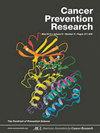非典型子宫纵隔肌瘤的种系和体细胞富马酸氢化酶检测
IF 2.6
3区 医学
Q2 ONCOLOGY
引用次数: 0
摘要
富马酸氢化酶(FH)基因中存在种系致病变异(PV)的女性会患上皮肤和子宫白肌瘤,并增加患侵袭性肾细胞癌的风险。在子宫肌瘤切除术或子宫切除术中诊断出非典型子宫肌瘤之前,这些妇女中的许多人并不知道自己有患癌症的倾向,因此在病理诊断出非典型子宫肌瘤后,简化遗传咨询流程至关重要。然而,在非典型子宫肌瘤病例中,FH 的种系致病基因/可能 PV 的发病率尚不清楚。为了更好地了解 FH 种系 PV 的患病率以及目前遗传咨询和种系基因检测的模式,我们对一个大型中心的非典型子宫白肌瘤病例进行了回顾性研究。我们比较了FH PV、FH野生型(WT)和未知基因检测队列的临床特征。在144例临床数据可评估的非典型子宫白肌瘤病例中,只有49例(34%)有记录的基因检测结果,12例(8.3%)有种系FH PV。有 48 例 IHC 定义的 FH 缺乏病例,其中 41 例(85%)进行了 FH 检测,9 例具有种系 FH PV,分别占检测病例群的 22% 和 FH 缺乏病例群的 18.8%。8.3%的可评估患者存在种系 FH PV,占完成基因检测人群的 24.5%。这些数据凸显了病理学与遗传咨询之间的脱节,有助于完善风险评估,从而为非典型子宫肌瘤患者提供咨询。预防相关性:被诊断患有富马酸氢化酶(FH)缺陷型子宫纵膈肌瘤的妇女罹患肾癌的风险会增加。这项工作建议为这些患者提供更标准化的病理-遗传咨询转诊途径,并建议在没有出现种系FH致病变体/可能致病变体的情况下,需要对FH缺陷性子宫纵隔肌瘤的潜在病因进行研究。本文章由计算机程序翻译,如有差异,请以英文原文为准。
Germline and Somatic Fumarate Hydratase Testing in Atypical Uterine Leiomyomata
Women with germline pathogenic variants (PV) in the fumarate hydratase (FH) gene develop cutaneous and uterine leiomyomata and have an increased risk of developing aggressive renal cell carcinomas. Many of these women are unaware of their cancer predisposition until an atypical uterine leiomyoma is diagnosed during a myomectomy or hysterectomy, making a streamlined genetic counseling process after a pathology-based atypical uterine leiomyoma diagnosis critical. However, the prevalence of germline pathogenic/likely PVs in FH among atypical uterine leiomyomata cases is unknown. To better understand FH germline PV prevalence and current patterns of genetic counseling and germline genetic testing, we undertook a retrospective review of atypical uterine leiomyomata cases at a single large center. We compared clinical characteristics between the FH PV, FH wild-type (WT), and unknown genetic testing cohorts. Of the 144 cases with atypical uterine leiomyomata with evaluable clinical data, only 49 (34%) had documented genetic test results, and 12 (8.3%) had a germline FH PV. There were 48 IHC-defined FH-deficient cases, of which 41 (85%) had FH testing and nine had a germline FH PV, representing 22% of the tested cohort and 18.8% of the FH-deficient cohort. Germline FH PVs were present in 8.3% of evaluable patients, representing 24.5% of the cohort that completed genetic testing. These data highlight the disconnect between pathology and genetic counseling, and help to refine risk estimates that can be used when counseling patients with atypical uterine leiomyomata. Prevention Relevance: Women diagnosed with fumarate hydratase (FH)-deficient uterine leiomyomata are at increased risk of renal cancer. This work suggests a more standardized pathology-genetic counseling referral pathway for these patients, and that research on underlying causes of FH-deficient uterine leiomyomata in the absence of germline FH pathogenic/likely pathogenic variants is needed.
求助全文
通过发布文献求助,成功后即可免费获取论文全文。
去求助
来源期刊

Cancer Prevention Research
医学-肿瘤学
CiteScore
6.00
自引率
3.00%
发文量
173
审稿时长
1 months
期刊介绍:
Cancer Prevention Research publishes original studies, reviews, and perspectives in the field of cancer prevention. Its scope includes the molecular and cellular biology of premalignancy and early lesions; genetic and environmental risk factors; risk assessment and reduction; early detection research (cancer screening and diagnosis); and preventive interventions (chemoprevention, immunoprevention, and others) to intercept cancer development at early stages prior to initiation, promotion, or progression. The journal comprises preclinical, clinical, and translational research, with special attention given to molecular discoveries and an emphasis on building a translational bridge between the basic and clinical sciences.
 求助内容:
求助内容: 应助结果提醒方式:
应助结果提醒方式:


